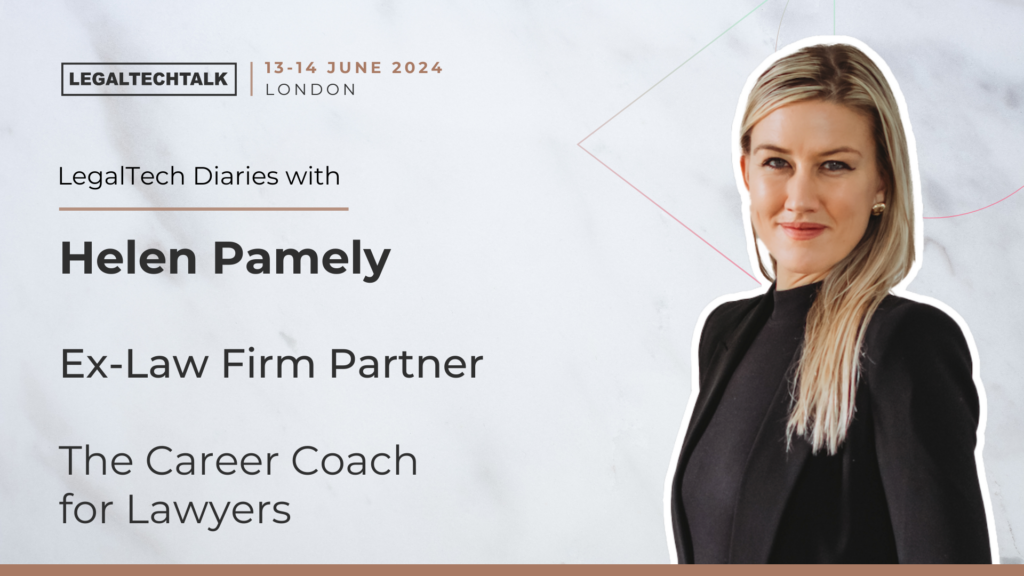In this interview, Helen Pamely, a former lawyer turned executive coach, shares insights on the roadblocks preventing legal professionals from reaching their full potential. Drawing from her experience at a Magic Circle firm and training in psychotherapy, Helen identifies two major hurdles: the lack of an entrepreneurial mindset and the pervasive issue of burnout within the legal profession.
Helen underscores the importance of lawyers adopting a business-oriented approach, cultivating skills like networking, business development, and client relationship management – abilities often overlooked in traditional legal training but crucial for career advancement. She also emphasizes the need for self-care and healthy boundaries to avoid burnout, advocating for cultural shifts within law firms to promote supportive environments and work-life balance.
Bradley Collins: Hi Helen, great to chat. To start the interview, I’d love to hear a bit about your background and what led you to start up your coaching career.
Helen Pamely: My coaching career was a long time in the making. Here’s the background:
I was lucky enough to start my legal career in the Magic Circle. This gave me exposure to great work and to learn from the best. After some time though, I noticed in law generally (and indeed across the world of finance) a couple of things that really held people back:
First: I saw people plateau in their careers because they didn’t understand that actually making it to the top in law requires a shift from an “employee mindset” to an “entrepreneur mindset” (i.e. building and managing the complexities of a business).
Second: people were working themselves to the bone and burning out. These tendencies lead to lawyers feeling unhappy, unfulfilled and also not reaching their potential.
On point one, from a private practice perspective, making Partner is about being great at business: knowing your market, knowing your clients, and knowing how to serve them, so that old clients return, and you win new ones. Many lawyers end up stuck a few years into their careers because they don’t have the networking or sales skills or the necessary book of clients; and law firms don’t support them in acquiring this skillset. To their surprise, several years in, many associates find out that partnership isn’t on the cards. This can be heartbreaking. From an in-house perspective, to make it to the top, you need to be an excellent networker and relationship-builder, as well as understand the commercial intricacies of the business inside out. Being a solid, technical lawyer isn’t enough.
On point two, it genuinely saddened me to see some of the most talented individuals in the world, held back in their own personal and professional growth due to burnout and mental ill health. I believe that to reach your potential and to become the best version of yourself, you need to feel well in yourself.
“Traditionally, in many law firms, lawyers have given their whole selves to the job. I personally take no issue with anyone’s ambitions. If you want to work seven days a week that’s fine by me. However, we all need downtime, and we all have our breaking point.
To help tackle all of this, alongside being a lawyer, I completed a four-year MA in Psychotherapy to equip me with the in-depth understanding of mental health I needed to properly support lawyers in their wellbeing. I was then accredited as an executive coach and founded my own unique coaching practice. Why? Because I wanted to find a quick and impactful way of bringing all the insight from psychology, neuroscience, coaching, and leadership I had learned, immediately to lawyers. It changed my life and I knew it could change theirs.
I went full-time with my coaching business in March 2022 and I haven’t looked back.
Bradley Collins: Thanks Helen. What would you say is the biggest preventative from legal professionals fulfilling their potential, and what’s an easy win to change this?
Helen Pamely: It’s really the two points I mentioned above. First, not knowing what it actually takes to be a successful Partner / senior lawyer in-house; and, second, burning out.
I don’t believe in “easy wins” but with the right mindset and personal work, there’s no reason why either of these issues should hold back any lawyer. On the entrepreneur mindset point, I coach people to approach building up their brand, their network, and their business, as a science, not an art. With clear strategies and a plan in place, there is no reason a successful law practice can’t be achieved.
On the well-being point, for many, this requires a mindset shift. Traditionally, in many law firms, lawyers have given their whole selves to the job. I personally take no issue with anyone’s ambitions. If you want to work seven days a week that’s fine by me. However, we all need downtime, and we all have our breaking point. It’s about understanding yourself well enough so that you know what you need to feel happy, fulfilled, and well. Then you have to take responsibility for that. No one can save you but you. There are many toxic cultures in law firms, and that’s a whole issue too, but ultimately, you decide your own boundaries.
Bradley Collins: Finally, what would be the biggest change you’d like to see within law firms from a cultural perspective and why?
Helen Pamely: I’d like to see two big changes. First, I’d like to see law firms giving associates proper training on business development, so they learn all of the skills necessary to help grow a law firm. Even if firms don’t see an associate as “partner material”, having associates who are great relationship-builders, great networkers, and who understand the firm from a business perspective; to my mind that can only be an asset.
Second, I’d like to see firms really invest in building supportive cultures where there is psychological safety. Too many lawyers of all levels are struggling because of unreasonable demands, a lack of support, a bullying boss and not enough downtime. If lawyers were more supported from a well-being and mental health perspective, they would actually be more efficient and productive, sickness costs would be reduced, as would the churn rate of associates.








